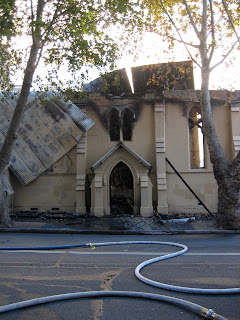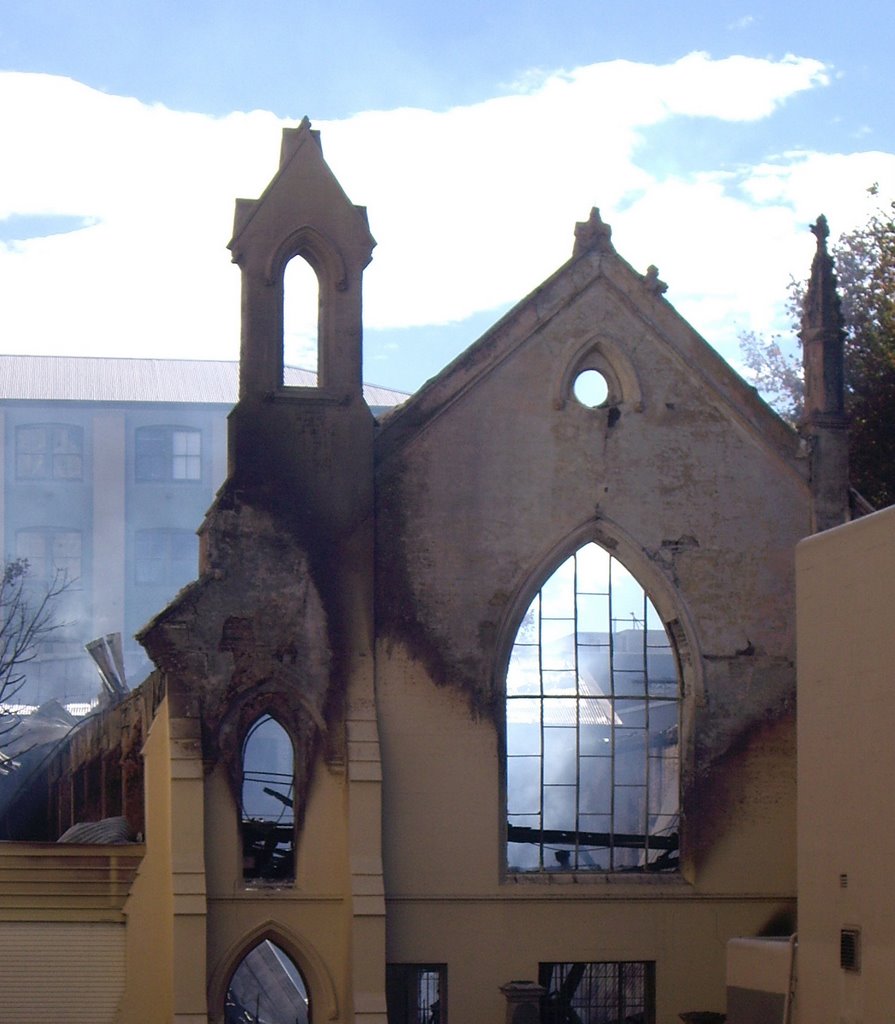 Having been tagged by Michael Jensen, I would like to praise five significant teachers in my life. As I am only allowed five, no offense is intended to the many gifted and caring teachers not found on this list. I have had four significant periods of formal education, so have picked one teacher from each period, and then taken the fifth from an experience of church.
Having been tagged by Michael Jensen, I would like to praise five significant teachers in my life. As I am only allowed five, no offense is intended to the many gifted and caring teachers not found on this list. I have had four significant periods of formal education, so have picked one teacher from each period, and then taken the fifth from an experience of church.
1. Mr Warren Glass
Thornleigh West Primary school
Year 5 was the most important year of my primary school experience, probably of my formal education overall. Until that year, I had been a good and conscientious student. After it, I loved learning. We might not have covered the syllabus, but we had a great time and my horizons were stretched.
Every morning, we would begin with music, lots of it, singing along to the funny-looking man with the guitar. Then, we would discuss current affairs, society and culture. Sometimes, he would just talk about something that had come up in the news and that would take us through to morning tea, or even lunch. Others hated it; I couldn't get enough. After lunch, he would read us books and get us to respond to them creatively, turning the classroom into the narrative we were experiencing. I am sure we must have done some maths and spelling and so on, but I really don't remember. What I do remember is regretting hearing the bell for the end of the day.
Throughout the year, Mr Glass loaned me books personally, and would talk about them when I returned them, forming in me habits of critical novel reading that have continued and broadened ever since. I trace my sense of humour to him. He would tell jokes all day, and the feeling of starting to "get" some of them was a treat. To him I also trace the beginnings of my sense of social responsibility, particularly ecological concern. And Year 5 was also the time that I realised that being a Christian isn't something that happens automatically, but involves personal loyalty to Jesus. Although it took me a few more years to explicitly own that loyalty, the ground-clearing work that happened with Mr Glass was crucial.
Wherever you are, Mr Glass, I salute you - and I thank God for you.
2. Mrs K. Ballantyne
James Ruse Agricultural High School
Year 11 was for my high school years what Year 5 was for my primary schooling. My memories of those two years are far more vivid and three dimensional than the other years put together. Mrs Bal taught me English in year 11 and much of year 12. Educationally, until that point I had focused heavily on maths and science, selecting my subjects to avoid the humanities and studying English under some duress (even though I loved reading). Indeed, Mrs Bal initially had to talk me out of doing the lowest level of English offered at Ruse. Nevertheless, by the end of year 12, I would go on to study Arts at Sydney University, majoring in English and Philosophy. Since I had Mr Ballantyne (husband of Mrs Bal) for Physics, this transformation was something of a victory for her. Mrs Bal introduced me to T. S. Eliot (I still clearly remember reading The Love Song of J. Alfred Prufrock), to the first Shakespeare I really understood, enjoyed and was moved by (Hamlet) and to the delightful Tom Stoppard response (Rosencrantz and Guildenstern are dead).
I remember a story I heard about her first ever classroom as a young teacher fresh out of college at a rough school. When she walked in, a boy was sitting on a ledge, dangling his feet out a second-story window. She walked over and shut the window on him, leaving him outside on the ledge for the whole period! Whether it's apocryphal or not, it captures something of her creativity and charm.
3. Dr Geoff Williams
Sydney University
I first met Geoff (and he was, I think, the first teacher whom I knew on a first name basis) in a second year English course called Grammar and Discourse, in which he opened my eyes to the nuts and bolts of how language works via systemic functional grammar. We were looking at language so closely that I ended up writing my essay for the course on the opening of a Beckett play and ran out of space after I had discussed the first ten words! This was probably one of the best two or three classes throughout my Arts degree, which I initially selected on timetable convenience and on the casual recommendation of an acquaintance.
However, it was Geoff's personal care for each student in a large class that really grabbed my attention. He quickly knew everyone's name (rare in a lecturer, particularly in a class of around 50 or 60) and took all of his own tutorials. He worked hard to provide excellent examples of the language patterns we were studying and simultaneously introduced me to his second field of expertise: children's literature. When I ended up writing an English honours thesis comparing Harry Potter and Narnia, he became my surrogate supervisor (my official supervisor, based on my initial submission, was a modernist specialist (momentum from Prufrock!) and was humble enough to acknowledge himself out of his depth when my topic shifted).
Years later, his invitation to help teach a modified form of the grammar course (which had become immensely popular and so they didn't have enough tutors) rescued my battered passion for teaching after a year in the deep end as a high school teacher without training or experience. He continued to follow my progress for many years after university and we would regularly catch up for coffee, until he recently accepted an exciting post in Canada. I must write to him again soon.
4. Rev Dr Andrew Cameron
Moore Theological College
Amongst many gifted teachers at Moore, Andrew's gentleness, humility and deep insight were a bastion of sanity and humanity in a hectic and demanding environment. When he first taught me Philosophy 1, he was under the mistaken impression that I had a PhD in Philosophy, which led to some extra stress for him (since his specialty is Ethics, not Philosophy) and some unearned cred for me! Since then, I have been in a number of his classes and have thoroughly enjoyed them all. I also always appreciate his social issues briefings, which come out every "few" weeks.
 In class, the wisdom and depth of his material was often veiled behind a lack of confidence and somewhat bumpy presentation, but there were so many gems that have formed me both academically and spiritually. Obviously, his love of ethics and Oliver O'Donovan in particular (see image)* have been very significant in shaping my own future direction.
In class, the wisdom and depth of his material was often veiled behind a lack of confidence and somewhat bumpy presentation, but there were so many gems that have formed me both academically and spiritually. Obviously, his love of ethics and Oliver O'Donovan in particular (see image)* have been very significant in shaping my own future direction.
*This is a picture of Andrew Cameron and Oliver O'Donovan. Andrew is wearing a shirt that our class made for him, which bears a portrait of OO'D with the caption "What would O'Donovan do?".
5. Rev Andrew Katay
St Barnabas' Anglican Church, Broadway
Many preachers and Bible study leaders have shaped me in a variety of related (and sometimes competing) traditions, but it is probably my years with Andrew Katay that have most significantly shaped my faith in Father, Son and Holy Spirit, my love of the holy scriptures and the gospel they proclaim (especially in the Gospels) and my hope in God's coming kingdom.
I met Andrew at my first SUEU event back in 1997 and worked closely with him for most of the five years I spent at Sydney Uni, in a variety of formal and informal contexts. Then, when Jessica and I were married and joined St Barnabas', Broadway, he was our pastor for another four and a half years (there is about eighteen months' overlap between these two periods) and for the final two years, he was also the immediate supervisor of my service as a catechist (student minister). During that time, I have listened to probably hundreds of his talks, sermons, studies, seminars and debates, and have spent hundreds of hours with him in committees, planning meetings, reading groups and casual conversations.
Although we chronically disagree in some areas (politics!), he helped me notice and begin to overcome many of the inherited dualisms in my theology, sharing a faith that is bigger and deeper than "Jesus saves": trinitarian in basis, christological in focus, cosmic in scope, graciously ethical in direction, generous in difference and with a resurrection hope.
-----
None of these teachers is without faults, but my prayer is to become a little more like the best in each of them.
Who have been significant teachers in your life? If you can't think of five, start with one. If you have a blog, consider yourself tagged. When you post, include a link in the comments here.





















